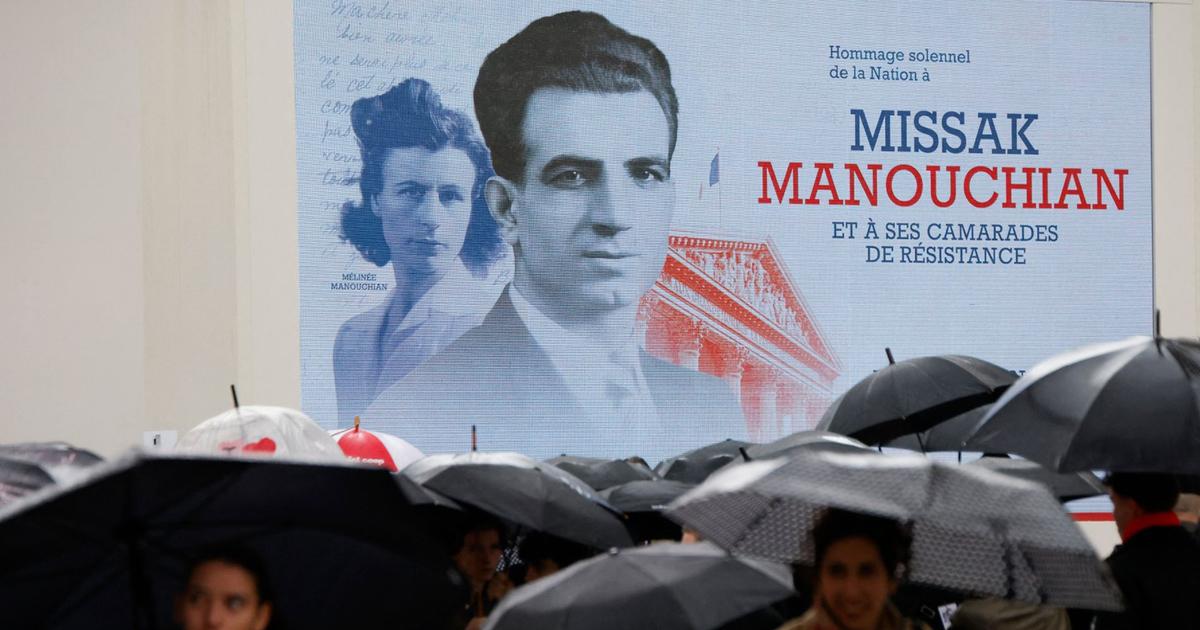To life, to death.
The Armenian resistance fighter and communist, Missak Manouchian, enters the Pantheon this Wednesday, February 21.
His coffin will be accompanied by that of his wife Mélinée, who died in 1989, who will be admitted at the same time as him into the temple of personalities who have marked the history of the French nation.
To discover
The keys to supporting women in their working lives
Born Mélinée Soukémian in 1913 in Constantinople (now Istanbul), she came from a wealthy family of civil servants in the Ottoman Empire.
Her destiny turns tragic when, aged only 3, she witnesses the tragedy of the Armenian genocide, which will take away her parents.
“Landless and without family, faced with persecution and poverty,” notes LCI, she grew up in orphanages, mainly in Greece, and particularly in Corinth, before being sent in 1926 to Marseille to continue her studies.
In France, the young stateless person trained as an accountant and stenographer, then settled in Paris.
Her destiny changed again in 1934. That year she met Missak Manouchian, during an event of the Relief Committee for Armenia.
Like her, he is a communist;
and like her, of Armenian origin.
A year later, in 1935, she met the young man again and their reunion took a romantic turn, when he invited her to dance.
Alas, the rider steps on her feet, which annoys Mélinée.
A few months later, during meetings of the HOC, the Relief Committee for Armenia, she met the unfortunate rider “with sparkling black eyes” again, as she relates in a book of testimony published by Éditions Parentheses.
This time will be the good one.
Both stateless, Missak and Mélinée have in common a full adherence to French civilization.
The love between them grows and the couple wastes no time.
The marriage was celebrated on February 22, 1936. The beginning of an alliance that was both personal and militant.
Close to the Aznavourians
Three years later, Missak Manouchian was interned as a foreign communist in a camp, then incorporated into the army.
On his return in 1940 to occupied Paris, he continued his militant activity clandestinely, distributing anti-Nazi leaflets with his historian friend Arsène Tchakarian.
But once again, his ideals stick with those of his wife who also decides to become actively involved in the fight against the Occupation.
Between 1941 and the end of 1943, between two clandestine actions, the couple regularly took refuge at 22, rue Navarin, near Pigalle, in the modest apartment rented by Misha and Knar Aznavourian, the parents of a certain... .Charles Aznavour.
On the ground, actions are multiplying.
While Missak joins the ranks of the snipers and supporters of immigrant labor (FTP-MOI), Mélinée works as a liaison agent.
She braves the dangers and helps her husband in the Resistance as much as possible.
And this, despite Missak's reluctance to expose him to danger.
No matter, the communist activist refuses to stay on the sidelines of the struggle, determined to make her voice heard against oppression.
She therefore takes care of identifying future targets, transporting weapons, and writing reports.
Farewell letter
On the morning of November 16, 1943, when Missak Manouchian was to meet the head of the FTP in the Paris region, Joseph Epstein, at the Evry-Petit-Bourg station, the two men were arrested then tortured and imprisoned for several months.
At the end of a mock trial reported in the collaborationist press, Missak Manouchian was shot on February 21, 1944 at the Mont-Valérien fort, at the age of 37, with around twenty of his comrades.
A few hours before his execution, he will say goodbye in a letter to his “dear Mélinée”, his “beloved little orphan”.
“I have a deep regret for not having made you happy, I would have liked to have a child with you, as you always wanted,” he wrote to her from Fresnes prison.
“I therefore beg you to marry after the war, without fail, and have a child for my happiness, and to fulfill my last wish, marry someone who can make you happy.”
Mélinée will receive the letter but will not respect Missak's wish, that of rebuilding her life.
Mélinee will never become a mother either.
A motherhood that she almost experienced, reveals
Le Monde
.
“Few know: Mélinée became pregnant at the start of the war, while she was working on “anti-Nazi literature”, and decided to abort.
An activist’s choice that “liberates” her,” writes journalist Ariane Chemin in an article published at the beginning of February.
“I would finally be able to give myself entirely to the cause for which I was fighting,” the resistance fighter even wrote.
Naturalized at the end of the war, Mélinée Manouchian will honor in the shadows the memory and the struggles of her husband, until the end of his life, in December 1989, in France.
In 1945, she traveled to Soviet Armenia to bring Missak's writings there.
The local authorities refused her an exit visa, and she remained there for many years before being able to return to Paris in 1964.
“They went as far as the ultimate sacrifice”
In a special issue of
L'Humanité
, her great-niece Katia Guiragossian has her words: “My grandmother Armène was Mélinée's sister.
She loved “Gypsy” and told me many anecdotes.
I had access to the big story through the small door, that of the intimate.
(...) Stateless, they fantasized about France and immediately adopted its motto, “Liberty, Equality, Fraternity”.
They embraced his values and were ready to do anything to defend them.
They went as far as the ultimate sacrifice.”
A sacrifice honored today.
Together, Missak and Mélinée Manouchian became the first foreign resistance fighters and communists to enter the Pantheon.
And with them, a plaque bearing the names of 23 comrades who died for France, killed by the Germans on February 21, 1944 and in the months that followed.

